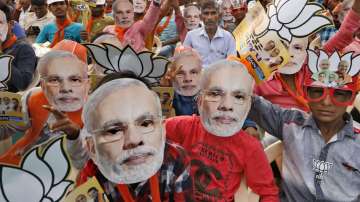Gujarat election impact: Why a Modi win or loss matters to the Indian stock market
Anecdotal evidence suggests that the market has rallied in 15 days prior to Gujarat polls and fell in the next 30 days after polling was over.

In three days, the country will know whether Prime Minister Narendra Modi's whirlwind campaign through the length and breadth of Gujarat results in a fifth consecutive term for the Bharatiya Janata Party in power. FULL COVERAGE ON GUJARAT ELECTIONS
Gujarat on Wednesday voted in the second and final phase and the results will be out on Monday. The exit poll conducted by India TV-VMR (Votersmood Research) projects BJP to win 113 out of a total of 182 assembly seats, while the main rival Congress is projected to win 66 seats, with three remaining seats going to 'Others'. 'Others' include Bhartiya Tribal Party (a Congress ally) and two independents.
A day after exit polls predict win for the BJP, key Indian equity indices opened on a higher note with healthy buying in banking, consumer durables and capital goods stocks. The wider Nifty50 of the National Stock Exchange (NSE) traded higher by 93.90 points or 0.92 per cent at 10,346 points.
The barometer 30-scrip Sensitive Index (Sensex) of the BSE, which opened at 33,456.02 points, traded at 33,540.24 points -- up 293.54 points or 0.88 per cent -- from its previous close.
Top brokerages too have responded positively to exit poll predictions of a BJP win, sensing political stability and smoother passage of legislation and economic reforms.
Whatever the result, the impact is expected to be visible both in terms of the way the stock market reacts as well as the bearing it has on the economic policies of the government going forward from here into 2019.
More importantly, it could set the tone for the Union Budget two months from now.
Data suggests that stock markets have been very sensitive to Gujarat polls.
Anecdotal evidence suggests that market rallied in 15 days prior to Gujarat polls in the last 3 out of four election years. The BSE Sensex rallied 7 per cent in the year 2002, followed by 2 per cent gain in 2007, and a 6 per cent rally in the year 2012.
The case has been no different in 2017, with the Sensex rallying nearly 1,000 points in just three trading session in the past three days.
On the other hand, the Sensex has come under pressure in two out of three election years once the polls have concluded.
Sensex fell up to 8 per cent in the next 30 days after polling is over in Gujarat. It slipped 1.6 per cent in the year 2002 and plunged as much as 7.8 per cent in the year 2007. The index rallied 3.2 per cent in the year 2012.
The upward trajectory of the Sensex - in the current and previous years - suggest that bookies are banking on a majority win on December 18 for the BJP which has been in power in the state for the past 22 years.
Political pundits and punters are placing their bets on a BJP win, something that the saffron party has displayed every time since 2002.
The markets too would expect a big win for the BJP as it would indicate political stability, a crucial factor that decides market sentiment.
The Gujarat Assembly elections of 2017 assumes greater significance because of the perception that the result would guide how the government goes forward with its reform agenda, something that has formed the cornerstone of the Modi government in rating upgrade or improvement in the Ease of Doing Business ranking.
A positive result, say experts, would imply that the government will stick to its reforms agenda. However, market watchers say a comprehensive win for the BJP in Gujarat could embolden it to consider measures that could hamper the sentiment.
While markets are expected to make considerable gains if the scenario of a BJP win, there is nervousness that an emphatic BJP victory could lead to the introduction of long-term capital gains tax for stock market in some form to make up for the shortfall in GST collections, a move that would dampen market sentiment, at least temporarily.
On the other hand, in the event of the Congress staging an upset for the BJP, analysts expect the markets to fall. Adverse reactions are expected of the market even if the BJP performs worse than expected.
On the government's part, it is expected to push the government towards some much-needed measures to resuscitate the economy, which has seen mixed results as far as economic indicators are concerned.
A loss for the BJP in Gujarat could see the Centre announce measures that would boost spending in the upcoming Budget. The Centre's much talked about stimulus package and higher public spending could be some measures in store.
Elections this time around could turn out to be a nail-biter. The BJP appears to have an advantage as far as political analysts are concerned, but there are also voices that see the Congress emerging much stronger this time around.
At the moment though, nobody is willing to stick his or her neck out and say which way the wind may blow. Whatever the outcome, markets could see price action on both sides depending on the results.